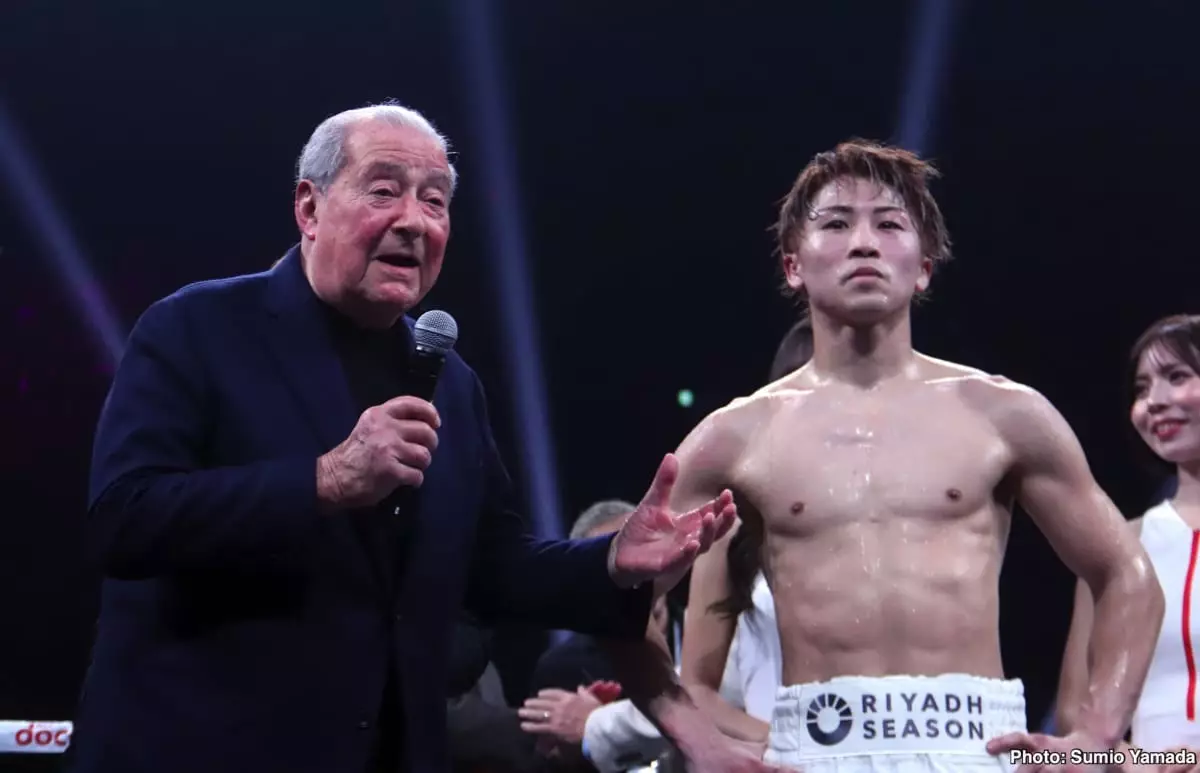The boxing world is ablaze with discussions surrounding the unified super bantamweight champion, Naoya Inoue, particularly following promoter Eddie Hearn’s recent scathing remarks. Hearn has not held back in his criticism, suggesting that Inoue should face dire consequences for allegedly avoiding his mandatory challenger, Murodjon Akhmadaliev. This situation raises profound questions about the integrity and competitiveness of boxing as a sport and challenges the notion of what it means to be a champion today.
Hearn’s criticism is grounded in the belief that Inoue has recently displayed a pattern of behavior that prioritizes safe, less challenging bouts over compelling matchups that could solidify his legacy. The promoter didn’t mince words during his interview, calling Inoue’s resume “s***t” and lamenting the apparent ease with which he has defended his titles against lesser-known opposition such as Ye Joon Kim and 38-year-old TJ Doheny. While Inoue’s talent is undeniable, Hearn’s words initiate a necessary debate regarding the quality of opposition that should define a champion.
In the eyes of many boxing purists, the sport is at its best when fighters are willing to take risks and engage in tough matchups that test their limits. Hearn’s assertion that Inoue has preferred to play it safe stands in stark contrast to the foundational values that many fans hold dear. The notion of boxing as a gladiatorial affair, where champions earn their status through overcoming formidable foes, is at risk of being diluted if champions consistently opt for the easier path.
Inoue’s most notable victory, against Stephen Fulton, showcases his capabilities as a top-tier fighter. However, when analyzing his recent record, it becomes evident that he has largely avoided high-stakes matchups. The psychological impact of his first major challenge against Nonito Donaire, where Inoue suffered significant injuries, looms in his subsequent decisions. This fear of injury could explain why Inoue seems disinterested in high-risk encounters, but navigating a champion’s path by avoiding threats may taint his legacy.
The Role of Promotion in Boxing Dynamics
Hearn’s strong words reflect a broader concern about the mechanisms of professional boxing, where promoters can play a significant role in shaping a fighter’s career trajectory. The relationship between champions and their promoters is critical; while fighters like Inoue must manage their legacies, promoters often prioritize profitability and fight marketability. The emergence of fighters like Inoue, who have proven their talent but opted for the path of least resistance, can lead to a climate where the integrity of the sport is compromised.
Additionally, the governing bodies in boxing such as the WBA and IBF also share responsibility in fostering competitive matchups. Hearn’s statements point to a failure within the existing system to enforce mandatory title defenses effectively. He mentions the repeated orders for Inoue to face Akhmadaliev and the financial permits paid to avoid such confrontations. This illustrates a troubling trend where boxers can navigate around challenge by leveraging financial resources, ultimately diminishing the sport’s competitive nature.
The dialogue surrounding Inoue’s fight choices encourages fans and analysts alike to reflect on what they truly expect from a world champion. With Hearn calling for accountability and urging fans to “wake up,” it is evident that there’s a collective yearning for champions to strive for greatness—not merely hold titles. The boxing community benefits from fighters who are willing to engage in riveting contests that ensure their legacies transcend mere statistics or titles held.
If Inoue or any other current champion wishes to cement their place in the annals of boxing history, they must be prepared to engage in challenging bouts that incorporate the spirit of competition. The prevalence of “easy fights” dilutes not only individual legacies but also the overall allure of boxing as a respected sport. Inoue’s journey as a champion could be vastly different if he decides to confront his mandatory challenger, Akhmadaliev, rather than opting for another safer route.
Eddie Hearn’s candid critique not only shines a light on Naoya Inoue’s current standing but also urges the boxing world to reconsider the attributes that define true greatness in the ring. As the sport continues to evolve, so must the expectations of those who seek to be recognized as champions in their fields.

